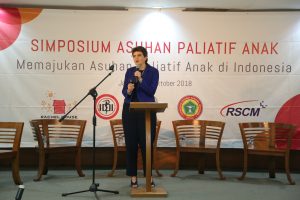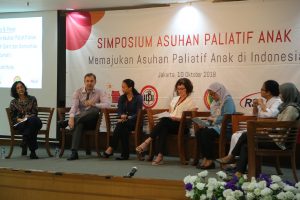A successful Paediatric Palliative Care Symposium with the call towards “Advancing Pediatric Palliative Care in Indonesia” was held in central Jakarta in October 2018. Organised by Rachel House – the pioneering paediatric palliative care service provider in Indonesia and hosted by Cipto Mangunkusumo Hospital – the largest national referral hospital in Indonesia, the symposium was attended by close to 200 participants, made up of doctors, nurses, pharmacists, nutritionists and social workers from all over Indonesia.
The overwhelming response we received for this first pediatric palliative care symposium in Indonesia confirm the increasing awareness of palliative care amongst medical professionals, and highlighted the demand and need for palliative care training, particularly pediatric palliative care, in Indonesia, said Lynna Chandra, the founder of Rachel House.
 “Among adult in-patients at Cipto, 30% of them are categorized as palliative cases, which is quite a big number. In palliative cases, we need to pay attention to the symptoms, especially in pain management; and from a hospital perspective, considering cost effectiveness, palliative care is important. Therefore in every hospital, it is essential to identify palliative care from the beginning, in both adult and pediatric cases, because, palliative cases need special treatments, including physical psychosocial, psychology and spiritual care. Palliative care also requires good collaboration on referrals from all stakeholders involved, from the primary care to hospitals, government medical offices and social organizations,” said Dr Sumaryono, the Medical Director of Cipto Hospital, in his welcoming remarks to participants from various private and public hospitals.
“Among adult in-patients at Cipto, 30% of them are categorized as palliative cases, which is quite a big number. In palliative cases, we need to pay attention to the symptoms, especially in pain management; and from a hospital perspective, considering cost effectiveness, palliative care is important. Therefore in every hospital, it is essential to identify palliative care from the beginning, in both adult and pediatric cases, because, palliative cases need special treatments, including physical psychosocial, psychology and spiritual care. Palliative care also requires good collaboration on referrals from all stakeholders involved, from the primary care to hospitals, government medical offices and social organizations,” said Dr Sumaryono, the Medical Director of Cipto Hospital, in his welcoming remarks to participants from various private and public hospitals.

Highlighting the need for children’s palliative care
The CEO of the International Children’s Palliative Care Network’s (ICPCN), Prof. Julia Downing, began the one-day symposium with the Global Outlook on Pediatric Palliative Care; sharing with the audience the latest statistics in the Lancet Commission report that cited that 2.5 million children die annually needing palliative care and pain relief, and 98% of these children are from Low and Middle Income Countries. Prof. Downing highlighted the call for the “alleviation of the burden of pain, suffering, and severe distress associated with life-threatening or life-limiting health conditions as a global health and equity imperative” in the report, and the need for public financing and full integration of palliative care into the national health systems as part of the Universal Health Coverage as one of the key solutions.
The day was packed with talks, as well as panel discussions that discussed amongst others, the role of palliative care in improving the lives of patients and families while at the same time reducing financial burden, the challenges faced by the hospitals in Indonesia in establishing and implementing palliative care in hospital and community setting, the role of management and the interdisciplinary team approach in solving problems for the benefit of patients, and importantly, discussions were also had on the role of palliative care for children living with serious illnesses other than cancer. The panelists included pediatricians, psychiatrists, pediatric nurses from public hospitals in Indonesia, as well as from Cincinnati Children’s Hospital and Perth Children’s Hospital.
“The topics were so rich and varied that it kept all the participants fully engaged through to the end – a rarity in Indonesia! It was particularly useful for me to hear about the challenges that each hospital faced in establishing their palliative care teams, and the solutions that worked for them,” said one of the participants.
At lunch time, participants were entertained by the movie screening of Little Stars, providing many the opportunity to hear from patients and families around the world the impact of palliative care in their lives.
Taking the next steps for children’s palliative care
 “The discussion has come a long way since we first visited Indonesia 3 years ago, at the invitation of Rachel House. We congratulate everyone on bringing this discussion so far forward and keeping the passion alive in the face of the many challenges discussed today,” Dr Mark Meyer from Cincinnati Children’s Hospital commented.
“The discussion has come a long way since we first visited Indonesia 3 years ago, at the invitation of Rachel House. We congratulate everyone on bringing this discussion so far forward and keeping the passion alive in the face of the many challenges discussed today,” Dr Mark Meyer from Cincinnati Children’s Hospital commented.
“I have learned so much and will definitely be back to see how my colleagues from Perth Children’s Hospital and I can contribute to this exciting development of pediatric palliative care in Indonesia!” said Suzanne Momber expressing her commitment to this endeavour that Rachel House has kickstarted.
ICPCN’s Chief Executive Prof Julia Downing said “It has been a privilege to be a part of this pioneering symposium, and to hear about the work that is being done to develop children’s palliative care in Indonesia. I would like to wish everyone continued success, courage and inspiration as you strive to reach children in need of palliative care across Indonesia.”
 The 1-day symposium was followed by a Roundtable Discussion involving 7 public hospitals on the way forward for Pediatric Palliative Care in Indonesia. Hosted by Rachel House, the discussion was facilitated by Dr Endang Widiastuti, and participated by Prof. Julia Downing, Suzanne Momber and Dr Mark Meyer. It is hoped that this group will work together over the next 12 months towards the concrete steps of bringing pediatric palliative care to many more hospitals in Indonesia, as well as advocating for the inclusion of palliative care in Indonesia’s Universal Health Coverage package.
The 1-day symposium was followed by a Roundtable Discussion involving 7 public hospitals on the way forward for Pediatric Palliative Care in Indonesia. Hosted by Rachel House, the discussion was facilitated by Dr Endang Widiastuti, and participated by Prof. Julia Downing, Suzanne Momber and Dr Mark Meyer. It is hoped that this group will work together over the next 12 months towards the concrete steps of bringing pediatric palliative care to many more hospitals in Indonesia, as well as advocating for the inclusion of palliative care in Indonesia’s Universal Health Coverage package.
If you would like to learn more about Rachel House’s palliative care training and education programs please get in touch.